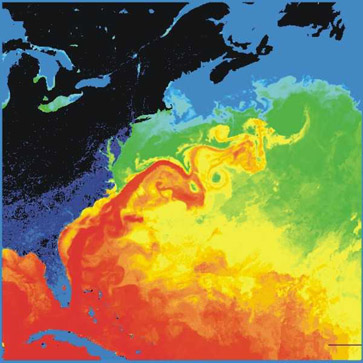| Online: | |
| Visits: | |
| Stories: |

| Story Views | |
| Now: | |
| Last Hour: | |
| Last 24 Hours: | |
| Total: | |
Interruption of the Gulf Stream May Lead to Large Cooling in Europe
The Eemian climate is believed to have been about as stable as that of the Holocene. Changes in the Earth’s orbital parameters from today (greater obliquity and eccentricity, and perihelion), known as Milankovitch cycles, probably led to greater seasonal temperature variations in the Northern Hemisphere, although global annual mean temperatures were probably similar to those of the Holocene.
The warmest peak of the Eemian was around 125,000 years ago, when forests reached as far north as North Cape, Norway (which is now tundra) well above the Arctic Circle at 71°10′21″N 25°47′40″E. Hardwood trees such as hazel and oak grew as far north as Oulu, Finland.
Credit: Wikipedia
The new evidence shows that the last time when temperatures were significantly warmer than today, climate instability occurred.
“This may have been caused by melt water coming from the Greenland Ice Sheet, disrupting the North Atlantic Ocean circulation. While the exact mechanism behind the sudden cooling still remains uncertain, the study illustrates the potential for major climatic instability in and around the North Atlantic region under future global warming”, says Karin Helmens at the Department of Physical Geography, Stockholm University.
The study was performed by an international research group led by Dr. Karin Helmens from Stockholm University and Bolin Centre for Climate Research (Sweden). The group also includes scientists from the University of Helsinki (Finland), University of Bergen and Bjerknes Centre for Climate Research (Norway), and VU University Amsterdam and University of Amsterdam (The Netherlands).
Contacts and sources:
Stockholm University
Citation: “Major Cooling Intersecting Peak Eemian Interglacial Warmth in Northern Europe” published in Quaternary Science Reviews: http://www.sciencedirect.com/science/article/pii/S0277379115002231 Karin F. Helmens, J. Sakari Salonen, Anna Plikk, Stefan Engels, Minna Väliranta, Malin Kylander, Jo Brendryen, Hans Renssen.
Source: http://www.ineffableisland.com/2015/06/interruption-of-gulf-stream-may-lead-to.html





